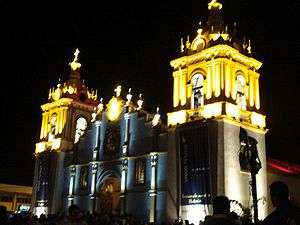Santiago de Veraguas
| Santiago de Veraguas | |
|---|---|
| City | |
|
Cathedral in Santiago de Veraguas | |
 Santiago de Veraguas | |
| Coordinates: 8°06′21″N 80°58′16″W / 8.10583°N 80.97111°W | |
| Country |
|
| Province | Veraguas |
| Founded | July 25th, 1621 |
| Area | |
| • Total | 975 km2 (376 sq mi) |
| Elevation | 101 m (331 ft) |
| Population (2010) | |
| • Total | 88,997 |
| • Density | 91/km2 (240/sq mi) |
| Time zone | ETZ (UTC-5) |
| Website |
santiago |
Santiago de Veraguas (Spanish pronunciation: [sanˈtja.ɣo ðe βeˈɾa.ɣwas]) is the capital of the province of Veraguas, in the Republic of Panama, and the district or municipality of the same name. Located in the countryside on the banks of the Pan American Highway. Bounded on the north by San Francisco District, south with the District of Montijo, east District of Atalaya and west by the District of La Mesa.
History and Summary
Santiago was founded by the people of Montijo and Santa Fe in the 17th century, who gathered in this place, decided to found a city that served as the starting center dispatches. It was established south of the Martin Grande river commonly called Los Chorros.
Santiago did not exist in 1606 when the Bishop of Panama, Don Antonio Calderon, wrote his account of the peoples who formed the Province of Veragua. The Santa Fe (the oldest), San Pedro del Montijo, Atalaya, Nuestra Señora de Remedios and Alanje.
Nor does the poor mapping made by Lorenzo del Salto, dated 1620.
The 2930 manuscript of the National Library in Madrid clearly states that Santiago existed in 1621 (folio 159 r °) which corroborates the hypothesis that its foundation must have taken place or in the late 16th century or the early 17th century. Dr. Alberto Osorio Osorio: Colonial Santiago de Veraguas, Panama 1989, 83 p
The chronicler Juan Diez De La Calle in his "Collection of Documents of the Civil and Ecclesiastical History of America", states that the "city of Santiago de Veragua was founded on October 23, 1621."
The writer gave an account where they made known Indian cities and towns of the kingdom of Tierra Firme. Other evidence about the existence of the old city of Santiago, as it is called in contemporary documents providing information about his transfer in 1637, come from other valuable references and unpublished documents.
So there are two well-defined moments in the pages of the story of Santiago, the city of Santiago de Veragua the old October 23, 1621 and the new 1637. Mario Molina: Veraguas, Land of Columbus and Urraca, 2008
Upon termination definitely the Court of the Audiencia of Panama by the Royal Decree of June 20, 1751, the country was ruled by a military government under the name of General Command of the mainland, which included the province of Veraguas.
On November 28, 1821 was proclaimed in Panama City, Panama Independence from Spain, on 4 December of that same year in the city of Santiago was proclaimed the Independence of the Veraguas province of Spanish power.
On November 9, 1903 at 3:30 pm, in the city, signed the Act of Accession to the separation of Panama from Colombia.
Villages
Santiago District comprises the following townships: Santiago, La Colorada, La Peña, La Raya de Santa María, Ponuga, San Pedro del Espino, Canto del Llano, Los Algarrobos, San Martín de Porres, Urracá, Edwin Fábrega, Carlos Santana Ávila, La Soledad, Rincón Largo, El Llanito and Rodrigo Luque.
Economy
Santiago's economy is based on trade, banking, agriculture and livestock. To a lesser degree in the pottery industry, in towns like La Peña, and leatherworking at La Colorada.
Demographics
The population of the city of Santiago is 88,997 inhabitants (National Census figures from 2010).
Infrastructure
Like other cities in the interior of the Republic of Panama, Santiago is a city without high buildings, but edifies of great historical value as Juan Demostenes Arosemena Normal School, Santiago Apostol Cathedral, The Museum, as well as more modern buildings. Although skyscrapers are no longer great works of architecture, we can mention the Omar Torrijos Herrera stadium with capacity for 7,000 spectators, the Hotel Gran David and Hotel Mykonos, Global Bank, the Public Registry, Shopping Center Galeria, the Transport Terminal, Convention Center Coopeve etc. There is also a large government-owned hospital, Luis "Chicho" Fábrega, and a major government family practice, Policlinica Horacio Díaz Gómez.
Tourism
The city of Santiago has 2000 rooms in hotels, pensions and temporary apartments such as Aparthotel Rosel, Camino Del Sol, Hostal Familiar Rolo, Family Hostal Veraguas, Cion Gi Hotel, Hotel Gallery, Hotel Gran David, Hotel La Hacienda Hotel Melior, Lake Lemon, Lake View Hotel, Hotel Pan China, Hotel Pirimidal, Hotel Plaza Gran David, Santiago Hotel, Hotel Hong, Aguila Pension, Pension Alessandra, Central Pension, Pension Santa Monica, Casa de las Palmas Bed & Breakfast, Hotel and hotel belen Vistalago Ecoresort
Mayors (1994-Present)
- 1994-1999
- Maio Luis Delgado
- PRD
- 1999-2004
- Plinio Donos PRD
- PRD
- 2004-2009
- Ruben Patiño
- PRD
- 2009-2014
- Gonzalo "Chalo" Adames
2014- 2019
- Edward Mosley Ibarra Alcalde
- Carlos Caly Ruiz Vice Alcalde
- PRD Tel:(507) 998-5453 / 998-5940
Geography
- Elevation: 101 meters.
- Latitude 8 ° 6 '20.57 "N
- Longitude 80 ° 58 '16.06 "W
Gallery


Cathedral Santiago Apostol 
Parque Santiago
